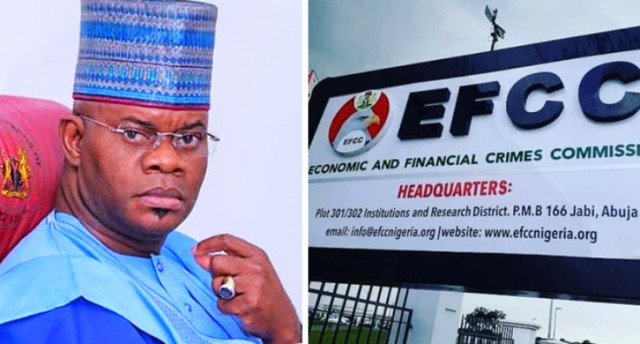The Chief Judge of the Federal High Court, Justice John Tsoho, has dismissed the request to transfer the N80.2bn fraud trial of ex-Kogi State governor, Yahaya Bello, from Abuja to Kogi State.
The CJ, in a letter dated July 2 and signed by his Special Assistant, Joshua Aji, said he agreed with the Economic and Financial Crimes Commission that Bello should be tried in Abuja and not Kogi State.
Justice Tsoho rejected Bello’s application dated June 10, praying that his trial for alleged N80.2bn fraud should be transferred to Kogi.
Bello’s lawyer, Adeola Adedipe (SAN), had on June 27 told the trial judge, Justice Emeka Nwite, that his client had applied to have his case transferred to Kogi.
Adedipe said, “After the proceeding on that day, we gave him (Bello) the report of what happened in court. I was made to understand that a letter had been written on behalf of the defendant to the honourable Chief Judge of the FHC requesting in substance that this matter be administratively transferred to the FHC Lokoja judicial division believed to have territorial jurisdiction.
“This issue is no longer in the hands of the Bar but the bench. If the honorable Chief Judge has taken an initiative, I need to give him the necessary respect.”
But the prosecuting counsel for the EFCC, Kemi Pinheiro (SAN), expressed displeasure about the attitude of the defence, insisting that Bello ought to have been in court for his arraignment.
In his letter to the counsel, the CJ said he agreed with the EFCC that the case should be tried in Abuja.
In the letter, the CJ’s SA, Aji, wrote: “I am directed by His Lordship, the Honourable, the Chief Judge to inform you that he has considered your arguments in support of the application for transfer of the defendant’s case from Abuja to Lokoja and the response of Dr. ‘Kemi Pinheiro, SAN, to the same.
“His Lordship’s position on the matter is as follows:
“The main complaint in the case borders on the alleged conversion and transfer of funds of Kogi State to Abuja, the Federal Capital Territory, to purchase property through acts of concealment.
“The law permits the filing of the charge either in Abuja, FCT or in Lokoja, Kogi State, the offence(s) having been allegedly partly committed in both places. Hence, this is distinguishable from IBORI v. F.R.N. (2008) LPELR8370 or (2009) 3 NWLR (Pt. 1127) C.A. 94 and other judicial authorities relied upon by the defendant.
“The prosecution has shown, with documentary evidence, that two criminal charges in the same scheme of alleged fraud leading to the charge against the defendant were earlier filed and are being tried in the Federal High Court, Abuja in Charge No.
FHC/ABJ/CR/550/22 F. R. N. v. 1. Ali Bello, 2. Dauda Suleiman and F. R. N. v. 1. Ali Bello, 2. Abba Daudu, 3. Yakubu Siyaka Adabenege, 4. Iyadi Sadat.
“In both charges, a formal application was made for their transfer to Lokoja, but the court, in a considered ruling, refused the application. The ruling has not been set aside and cannot be reversed by administrative fiat.
“There is documentary evidence of a pending appeal in Yahaya Adoza Bello v. F. R. N. filed on 17/05/2024, wherein the defendant as appellant sought a consequential order remitting the case to the Chief Judge for reassignment. It is not proper to take any step that will be tantamount to pre-empting the outcome of the appeal.”
“The main issue raised is jurisdictional in nature and will be more appropriately decided by the court. The matter should, therefore, be presented in the open court.
“Please, accept the esteemed regards of His Lordship, the Honourable, the Chief Judge,” Aji added.
Bello has been having a running battle with the EFCC over alleged N80.2bn fraud.
The anti-graft agency had declared his wanted following his repeated absence in court for his arraignment.
At the June 27 proceedings, the EFCC lawyer, Pinheiro, had urged the court to jail Bello’s lawyer for reneging on their commitment to produce him in court for his arraignment.
Pinheiro said, “Since no reason has been offered by Adeola (for Bello’s absence), Your Lordship should treat this as professional misconduct and contempt of court.
“We urge the court to exercise disciplinary jurisdiction over the lawyers so as to preserve the integrity of the judiciary.
Justice Nwite adjourned till July 17 for ruling.




















